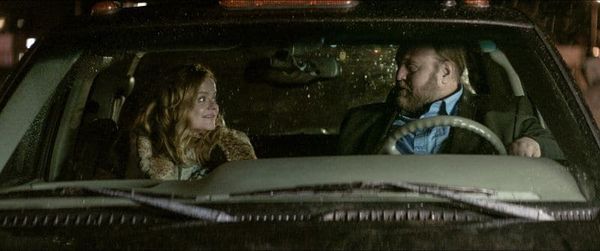Eye For Film >> Movies >> Virgin Mountain (2015) Film Review
Virgin Mountain
Reviewed by: Amber Wilkinson

Dagur Kári returns to the themes of isolation and tenative connection that marked out his 2003 feature debut Noi Albinoi for this latest film, which scooped up a hat-trick of prizes, including best narrative feature, at this year's Tribeca Film Festival. But Noi was a withdrawn teenager, and his progress had a touch of ice, whereas there is a distinct and growing warmth to the story of Fúsi (Gunnar Jónsson) - the chaste mountain of the title - a man of Hagrid-like stature, who immediately seems to fill any room he walks into, which may be one of the reasons he has made space for few others in his life.
Working as a baggage handler at the local airport, Fúsi's isolation is emphasised by Kári as we watch him - from above and a distance - move a truck around the runway. He would fold in on himself if he could, yet his size, far from being protective, makes him a target for workplace bullying. Still living at home and being (s)mothered by his mum, he spends his spare time re-enacting battles with toy soldiers - although in the true spirt of heroes who fail to spot their own arrested development, he quickly points out to a neighbourhood little girl (Franziska Una Dagsdóttir) who befriends him that "this is not for kids". Even his weekly trips to the local Thai joint are of the table-for-one, "same as usual" variety.

Kári emphasises the offbeat humour of the situation by introducing a pleasingly absurdist catalyst for change - a birthday gift of line-dancing classes from his mother. Despite being filled with horror at the prospect, a drive to the class leads to an unexpected meeting with Sjöfn (Ilmur Kristjansdottir) a bright and bubbly rubbish collector, who dreams of opening a flower shop. As their tentative relationship begins to blossom, it seems Sjöfn may look outwardly more 'normal' than Fúsi, but she has her own personal mountain of problems.
Kári's deadpan approach to comedy and humanstic approach to his characters recalls the work of Aki Kaurismäki. And like the Finnish director, he also doesn't let society off the hook, suggesting how easily people can be judged on appearances in ways that causes Fúsi both physical and mental pain.
However, it is the casting of Jónsson that is the film's master stroke. Known as a comedian in Iceland, he brings a great sense of underplayed comic timing to Fúsi, resulting in a big impact from small gestures. Kári is patient, letting Fúsi fill the frame and lingering, so we sense his discomfort or pleasure. Although the film moves very fast all of a sudden, in terms of development, the narrative beats feel truthful and Kári avoids sentimentality and neat resolution in favour of the more tantalising prospect of people finding it in themselves to embrace change.
Reviewed on: 02 Sep 2015















